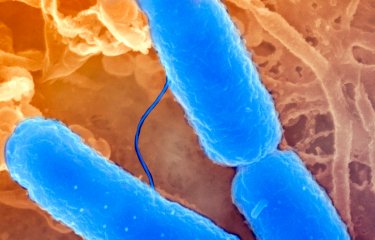The bacterium Shigella flexneri, responsible for shigellosis, or bacillary dysentery, acts by invading intestinal cells. Researchers from the Institut Pasteur associated with Inserm have now shown how this bacterium modulates the inflammatory response at the cell level to ensure its survival. By deciphering the mechanisms at work, they are pointing out to possibly new therapeutic targets, opening a way to search for new generations of anti-inflammatory drugs and immunomodulators. In this way, the study of a bacterial disease could eventually prove useful in treating such diseases as ulcerative colitis or Crohn's disease.
Press release
Paris, december 11, 2006
Shigellosis, or bacillary dysentery, is one of the most severe diarrhoeal diseases, causing 600,000 to 1 million deaths per year. The bacteria responsible for this disease, Shigella, invade intestinal epithelial cells, then the tissue making up the colorectal mucosa. This process results in an acute colitis marked by severe, inflammatory tissue destruction.
The team of Philippe Sansonetti, head of the Molecular Microbial Pathogenesis Unit (Inserm Unit 786, "Microbial Invasion and Colonization of Mucosa") at the Institut Pasteur, has specialized in the study of this infection, which also serves as a model for understanding other inflammatory bowel diseases.
The team has just demonstrated that Shigella developed strategies to modulate the inflammatory response-the host’s first line of defence-in order to diminish it and change its profile so that the bacteria can survive in the intestinal epithelium.
Activation of proinflammatory genes in the host cell largely depends on the activation of a signaling pathway called NF-kB. To activate these genes, transcription factor NF-kB must first be freed from the complex it forms in the cellular cytoplasm with another molecule (I-kB). It can then pass into the cell nucleus and activate proinflammatory genes.
The researchers have shown that Shigella are capable of blocking the NF-kB pathway at two levels.
In the first study, performed by Claude Parsot’s group that appeared in PNAS (1), they demonstrated that Shigella, by means of a "molecular syringe", inject into target cells a protein called OspG that keeps NF-kB in its complexed form in the cytoplasm, therefore preventing it from passing into the cell nucleus and activating proinflammatory genes.
In a second study conducted by Laurence Arbibe, which has just appeared in Nature Immunology (2), and which was done in collaboration with another Pasteur group, the team showed that a second protein injected into the cells by the bacterium, OspF, acts in the cell nucleus, using "epigenetic" modifications to prevent access by the NF- B complex to its target promoters, and thus prevents the activation of proinflammatory genes essential to the innate response.
"These discoveries reveal two important stages in the inflammatory response that Shigella are capable of blocking. We will now be able to search for molecules that block these precise stages, and, we hope, find new medicines against inflammatory intestinal diseases as a result", emphasizes Sansonetti.
In consequence, one of the solutions proposed by researchers for finding new methods of treatment against inflammatory intestinal diseases aims at trying to mimic the strategies developed by one bacterium during its long coevolution with its human host.
Sources :
(1) "The Shigella flexneri effector OspG interferes with innate immune responses by targeting ubiquitin-conjugating enzymes": PNAS, September 27, 2005
Dong Wook Kim (1), Gerlinde Lenzen (2), Anne-Laure Page (1), Pierre Legrain (2), Philippe Sansonetti (1), and Claude Parsot (1)
1.Molecular Microbial Pathogenesis Unit, Institut Pasteur-Inserm U786 Joint Unit. 2. Hybrigenics, Paris.
(2) "An injected bacterial effector targets chromatin access for nuclear factor kappa B to alter transcription of host immune genes": Nature Immunology, online (December 10, 2006)
Laurence Arbibe (1,2), Dong Wook Kim (1,2), Eric Batsche (3), Thierry Pedron (1,2), Bogdan Mateescu (3), Christian Muchardt (3), Claude Parsot (1,2), and Philippe Sansonetti (1,2)
1. Molecular Microbial Pathogenesis Unit, Institut Pasteur, Paris 2. Inserm U786 3. Genetic Expression and Disease, CNRS URA 1644, Developmental Biology Department, Institut Pasteur, Paris.
Contact press :
Institut Pasteur
Nadine Peyrolo ou Corinne Jamma
33 (0) 1 40 61 33 41 - cjamma@pasteur.fr
Inserm
Séverine Ciancia
33 (0) 1 44 23 60 86 - presse@tolbiac.inserm.fr



